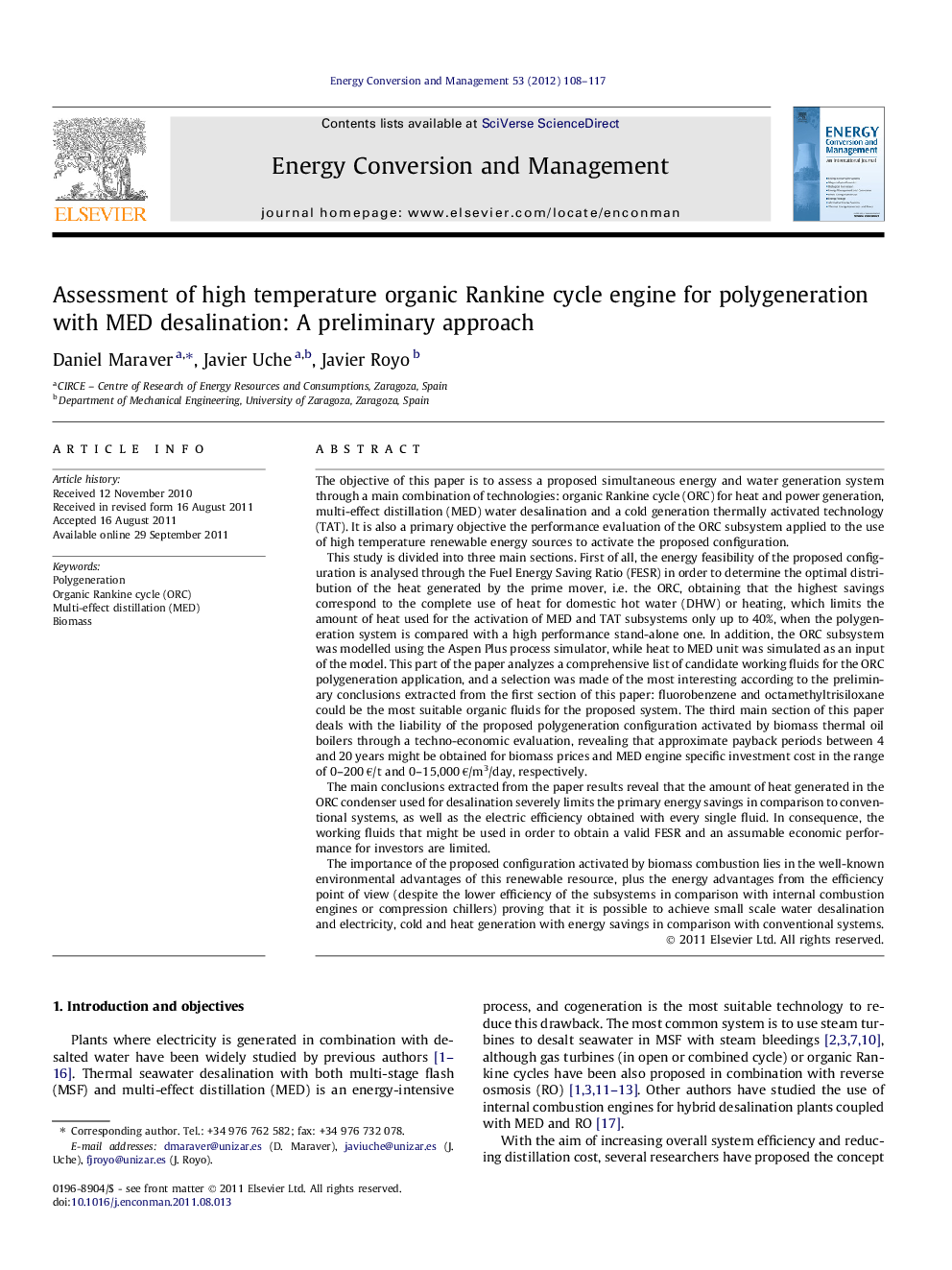| کد مقاله | کد نشریه | سال انتشار | مقاله انگلیسی | نسخه تمام متن |
|---|---|---|---|---|
| 764354 | 896981 | 2012 | 10 صفحه PDF | دانلود رایگان |

The objective of this paper is to assess a proposed simultaneous energy and water generation system through a main combination of technologies: organic Rankine cycle (ORC) for heat and power generation, multi-effect distillation (MED) water desalination and a cold generation thermally activated technology (TAT). It is also a primary objective the performance evaluation of the ORC subsystem applied to the use of high temperature renewable energy sources to activate the proposed configuration.This study is divided into three main sections. First of all, the energy feasibility of the proposed configuration is analysed through the Fuel Energy Saving Ratio (FESR) in order to determine the optimal distribution of the heat generated by the prime mover, i.e. the ORC, obtaining that the highest savings correspond to the complete use of heat for domestic hot water (DHW) or heating, which limits the amount of heat used for the activation of MED and TAT subsystems only up to 40%, when the polygeneration system is compared with a high performance stand-alone one. In addition, the ORC subsystem was modelled using the Aspen Plus process simulator, while heat to MED unit was simulated as an input of the model. This part of the paper analyzes a comprehensive list of candidate working fluids for the ORC polygeneration application, and a selection was made of the most interesting according to the preliminary conclusions extracted from the first section of this paper: fluorobenzene and octamethyltrisiloxane could be the most suitable organic fluids for the proposed system. The third main section of this paper deals with the liability of the proposed polygeneration configuration activated by biomass thermal oil boilers through a techno-economic evaluation, revealing that approximate payback periods between 4 and 20 years might be obtained for biomass prices and MED engine specific investment cost in the range of 0–200 €/t and 0–15,000 €/m3/day, respectively.The main conclusions extracted from the paper results reveal that the amount of heat generated in the ORC condenser used for desalination severely limits the primary energy savings in comparison to conventional systems, as well as the electric efficiency obtained with every single fluid. In consequence, the working fluids that might be used in order to obtain a valid FESR and an assumable economic performance for investors are limited.The importance of the proposed configuration activated by biomass combustion lies in the well-known environmental advantages of this renewable resource, plus the energy advantages from the efficiency point of view (despite the lower efficiency of the subsystems in comparison with internal combustion engines or compression chillers) proving that it is possible to achieve small scale water desalination and electricity, cold and heat generation with energy savings in comparison with conventional systems.
► Assessment of a polygeneration system based on ORC, MED and absorption cooling.
► Heat use for MED and cooling activation is limited to 40% to obtain energy savings.
► Evaluation of 33 possible working fluids for the polygeneration system prime mover.
► Fluorobenzene and octamethyltrisiloxane could be the most suitable working fluids.
► The activation of this system through biomass combustion is economically feasible.
Journal: Energy Conversion and Management - Volume 53, Issue 1, January 2012, Pages 108–117